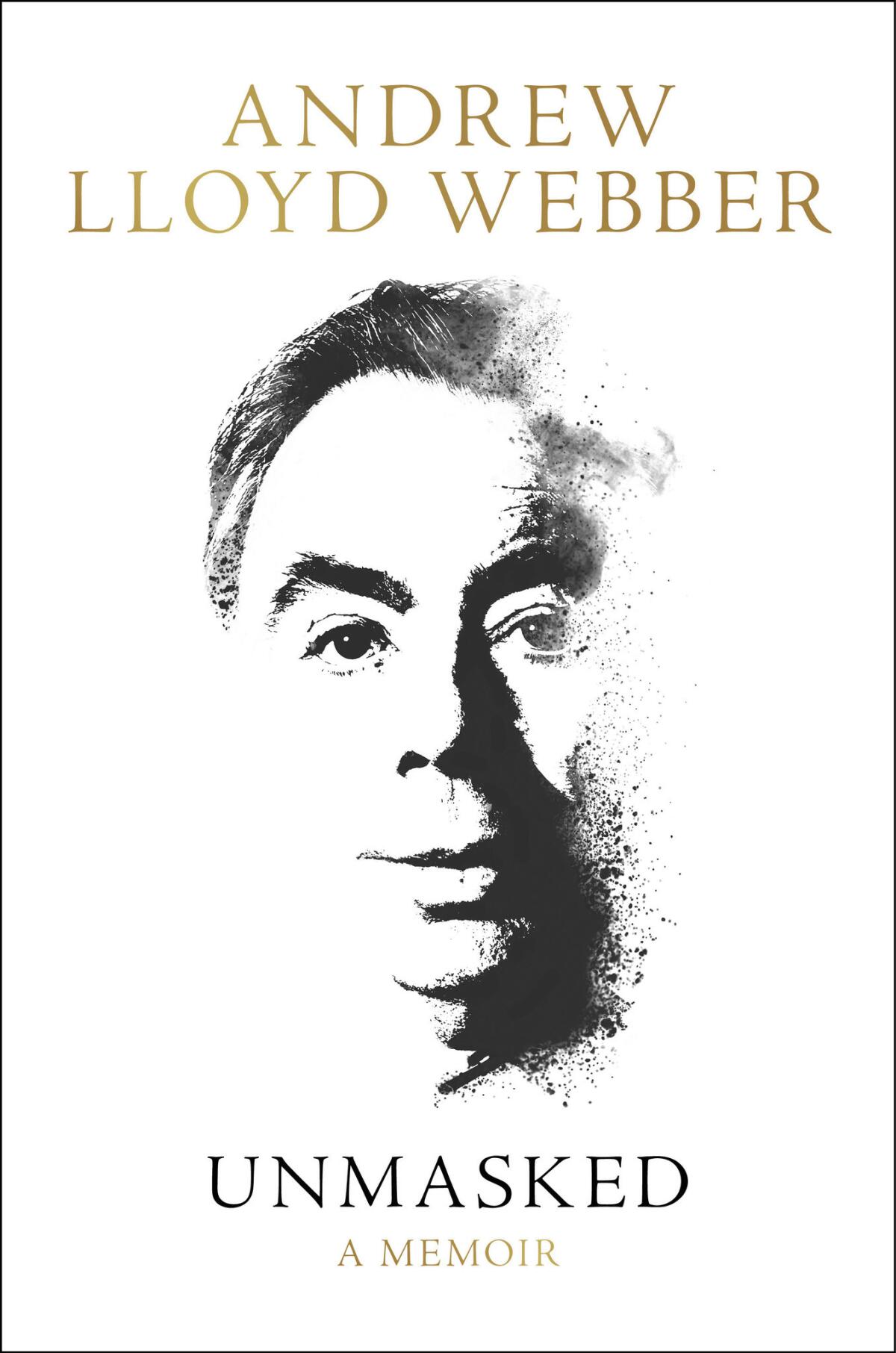Review: Is this Andrew Lloyd Webber ‘Unmasked’ in a new memoir? Mmm, not quite

- Share via
Andrew Lloyd Webber, theater’s master of spectacle, offers an early revelation in his new autobiography, “Unmasked,” out Tuesday from Harper: “I intended to write my memoirs in one volume, and I have failed spectacularly.”
The nearly 500-page “doorstop,” as the 69-year-old author affectionately derides his effort, “judders to a halt at the first night of ‘Phantom of the Opera.’”
That was in 1986, so a second volume does seem inevitable — although, as the English composer darkly hints in his coda, it won’t be as chipper as this one.

Lloyd Webber’s astonishingly successful career in musical theater caught fire in 1969 with “Joseph and the Amazing Technicolor Dreamcoat,” a 20-minute “pop cantata” he composed as a teenager. The following two decades were a juggernaut of inspirations, compositions and negotiations that produced “Jesus Christ Superstar,” “Evita,” “Cats” and “Phantom,” to name only the most record-breaking, wealth-generating, paradigm-changing of his projects. During the same period he married twice, fathered two children (he has since been married a third time and fathered three more) and bought and restored an English country estate.
His agent once quipped, “Andrew is too busy to have a wee.”
Then, after the success of “Phantom,” Lloyd Webber experienced a dry spell. “When things are not going your way, you discover who your true friends are,” he writes, explaining why it may be for the best that this volume ends where it does. “I have found some toe-curling truths about so-called friends and colleagues and I really don’t relish the thought of raking over them.”
This statement seems implausible, if only because Lloyd Webber’s tone throughout “Unmasked” is one of such exuberant pleasure in raking over things. He writes as if he is chatting with the reader over a bottle of Barolo. (Although he no longer drinks alcohol, he mentions casually, he put away “gallons” in his time.) The effect is enhanced by a breezy disinterest in commas, as well as his distinctive turns of phrase: People “ankle” places instead of going to them, and exaggeration is “elasticating the truth.”
He has some dishy tidbits to share, but it is not always easy to catch hold of them in his torrent of anecdotes. He loves to reminisce as much about the business side of his career as about the art, and he regularly lists the sums he earned or disbursed over the years, all translated into their current value in British and U.S. currency.
Sometimes these financial reports spool on for pages and pages without, ultimately, rewarding close attention. Other, far more diverting tales about his and other people’s love affairs could stand more fleshing out.
In several instances, he builds up a juicy revelation, only to pull away at the critical moment: “What happened is beyond the scope of this volume,” he’ll airily conclude, or, “I will leave it at that.”
And every few pages, he drops a startling aside and just leaves it there. One example: “My mother co-founded a pre-prep school called the Wetherby with a couple called Mr. and Mrs. Russell, the former being interested in bare-bottom spanking.”
The Russells could be the subject of a book of their own — and most likely figure in many grown men’s nightmares — but they don’t make a second appearance in this one.
Such omissions, of course, can be chalked up to the peculiar resignation of survivors of British boarding schools. Lloyd Webber later alludes to a “sadistic” gym master from his youth, adding jauntily, “I don’t think I’m vindictive by nature but when I read in the school magazine one morning years later that Mr. Murray had died, I wrote two tunes and had a bottle of wine for lunch.”
Despite taking to task people who hurt or disappointed him, Lloyd Webber really doesn’t come off as vindictive. His reflections on his first collaborator, lyricist Tim Rice — they wrote “Joseph,” “Superstar” and “Evita” together before falling out — are far more wistful than spiteful. His rapturous description of their first meeting at his apartment door could be plagiarized from a Harlequin romance: “Silhouetted against the decaying lift was a six foot something, thin as a rake, blond bombshell of an Adonis.“
Even after the acrimony, betrayals and litigation set in, Lloyd Webber continued to dream that he and Rice would be writing partners for life.
“I have long been baffled about Tim’s preoccupation with billing,” Lloyd Webber writes. “On all our shows he has insisted his name goes first. I couldn’t care less. I just think Lloyd Webber and Rice sounds better than the other way round.”
Although this argument does not suggest profound self-awareness — you can practically hear Rice wailing with frustration, deep in his own country mansion, when he gets to this page — Lloyd Webber can also be endearingly tough on himself. After describing an early tantrum he pitched over sound quality, he muses, “Looking back, I realize that my angst in the studio was the first of many meltdowns I have had. … I have behaved appallingly in theaters because of bad sound more times than I care to mention.”
'The story of Evita is simple' is perhaps the book’s most controversial claim, starkly undermined by the ensuing plot summary.
He developed such a reputation that director Milos Foreman approached him to play Wolfgang Amadeus Mozart in his film “Amadeus.” When Lloyd Webber protested that he was a “hopeless actor,” Foreman rejoined, “Oh, no. I hear you’ve got a foul temper. You’ve just burped brilliantly and you are a hot-headed perfectionist who can be extremely obnoxious. I want you to play yourself.”
A notorious ladies’ man, Lloyd Webber is also up front about his occasional caddish treatment of women, particularly his first wife, Sarah Hugill, the woman he married when she was barely 18, then abandoned a decade later for soprano siren Sarah Brightman, his “Phantom” muse.
He seems to take a perverse pleasure in quoting the worst reviews each of his shows received — perhaps because they make the ensuing Tony Awards and decades-long runs even more triumphant.
The story of how each production made it to the stage is a heartwarming Little-Engine-That-Could fable, full of fears and obstacles, broken ankles, fits of pique, packed houses of “vultures excitedly anticipating the rich pickings of theatrical catastrophe” and last-minute miracles. The most gripping of all is the one about “Cats.” There could not have been a less propitious idea for a musical — T.S. Eliot's cat poems, no real storyline, dancers doing feline things in leg warmers — with such a triumphant ending.
It is fashionable among theater intellectuals to look down on Lloyd Webber’s musicals: their catchy tunes, their ripe orchestrations, their puzzling stories (“The story of Evita is simple” is perhaps the book’s most controversial claim, starkly undermined by the ensuing plot summary) and of course their commercial success.
But by his own admission in “Unmasked,” Lloyd Webber has never been fashionable. He had a difficult childhood with neurotic, demanding but distant parents. As an “effeminate boy in a smart school suit clutching poncy architectural guidebooks,” he had to run away from bullies. He infuriated teachers with his admiration of Victorian architecture and the operas of Puccini. He loved melody, and throughout his lifetime, melody was never in vogue. He once asked a conductor friend to explain minimalism to him. After a few vain attempts, the conductor gave up: “There’s no point in explaining this to you, Andrew. You are a maximalist.”
But his unfashionable passions started and sustained hundreds of careers, made billions of dollars and changed the history of theater forever. Not a bad start to a life story.
♦ ♦ ♦ ♦ ♦ ♦ ♦ ♦ ♦ ♦
‘Unmasked’
Andrew Lloyd Webber
Harper: 487 pp., $28.99
See all of our latest arts news and reviews at latimes.com/arts.
ALSO
As Kennedy bios go, 'Jackie Unveiled' is more sketch than portrait
A spectacular new 'Uncle Vanya' at San Diego's Old Globe
Brilliant acting and direction drive a modern 'Streetcar Named Desire'
The biggest entertainment stories
Get our big stories about Hollywood, film, television, music, arts, culture and more right in your inbox as soon as they publish.
You may occasionally receive promotional content from the Los Angeles Times.







